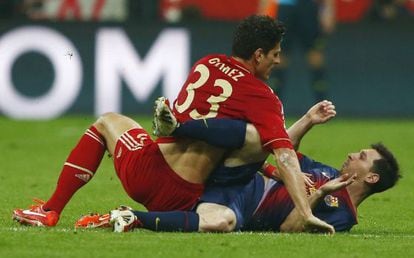Mannschaft against boys
Bundesliga provides Spain with a wake-up call in Champions League semis

Spanish soccer was left reeling after being picked apart by the Bundesliga in this week’s Champions League semifinals. Both Barcelona and Real Madrid conceded four goals on the road against Bayern Munich and Borussia Dortmund respectively in the clearest signal in years that a shift is occurring in European soccer’s powerbase: it has been 12 years since a German side won the competition; Bayern in 2001, although the Bundesliga champion was runner-up in 2010 and 2012. Dortmund has not been to the final since 1997, when it lifted the trophy. It now seems highly likely that both will take the field at Wembley on May 25.
“They were better than us; they were much stronger. They beat us in everything and were superior,” said Leo Messi after Jupp Heynckes’ side thrashed Barcelona 4-0 at the Allianz Arena. The world player of the year was not far wrong. Conditioning was a feature of both matches; the German sides are formidable physically, with the ability to cover the entire field for 90 minutes, defend as one and strike in lightening counterattacks. Neither Barça nor Real had any answer.
The lack of competition in La Liga offers no clue as to the sudden dominance of the Bundesliga: Bayern has already wrapped up the German title, holds a goal difference of +75 and will play Stuttgart in the German cup final after thumping Wolfsburg 6-1 in the semis. Dortmund, champion the past two seasons, is second in the league and eight points clear of Bayer Leverkusen in third. The two-horse panorama so tediously played out in Spain is far from absent in the Bundesliga.
They were better than us, they beat us in everything and were superior”
The simple truth is that both Barcelona and Real Madrid are approaching the end of a cycle. José Mourinho is bound to leave the Bernabéu at season’s end and will be as much remembered for overseeing Dortmund’s spectacular 4-1 win as he will for grimacing in impotence when Barcelona stuffed his side 5-0 when he had been in charge for a few months. Real is obsessed with its pursuit of the décima. It is extremely unlikely that it will be sated this season, and with Mourinho gone, whither the erstwhile European champion?
Barcelona’s demise is more to with its playing staff than its leadership. The suspicion that Pep Guardiola was extremely fortunate to be handed Barcelona’s squad in 2008 will remain until he achieves something significant with Bayern next season — although quite how anybody could improve Heynckes’ team is a mystery. His successor, Tito Vilanova, is overseeing the end of that glittering era. Xavi, Carles Puyol and other squad members are not getting any younger, Víctor Valdés is bored of inaction and set to leave and the whole team has become entirely dependent on Messi to bail it out of sticky situations.
Rivals have also figured out how to counter Barça’s tiresome possession game — let them have it, just don’t let them shoot. Making pretty passing triangles on the halfway line will not deter anybody when one shot between the sticks is all that results. That was how often keeper Manuel Neuer was called into action in Munich. Two on-target shots were mustered against Paris Saint-Germain, a game which required a half-fit Messi to resolve.
Real’s problem goes significantly deeper: unlike Barcelona it has never had a policy of playing home-grown talent. What it currently possesses, the ostracized Iker Casillas aside, is an expensively assembled group of players. Dortmund possesses a team, albeit one that Bayern is eyeing greedily as it continues its drive to turn the Bundesliga into a race between a thoroughbred and a donkey on the sands of Weston-super-Mare. Mario Götze has already been plucked from its nearest domestic rival and Robert Lewandowski, scorer of Dortmund’s four goals in the Westfalenstadion, is also on the menu.
Like Barcelona, it will not require a lion to make Bayern successful next season. At Real, it will require a complete change of style. Mourinho’s bunker mentality has alienated most of his playing staff and half of the Bernabéu, while his towel-throwing of the league was a sucker punch for club president Florentino Pérez. Two misfiring forwards, a red-card magnet, a 60-million-euro Brazilian paperweight and Europe’s nouveau riche sniffing around Cristiano Ronaldo makes for a summer of upheaval at Real.
Perhaps it could tempt the deliciously eccentric Jürgen Klopp to make the move from Dortmund. Borussia bought Shinji Kagawa for 350,000 euros from the Japanese second division and sold him for 16 million. Klopp also spotted Lewandowski and parted with less than five million for his services. He even conned Real into stumping up 10 million for Nuri Sahin, then bought him back for a song. It’s a far cry from the galácticos policy, but unlike Real’s impotent flag-planting, it’s taken Dortmund to the stars.










































